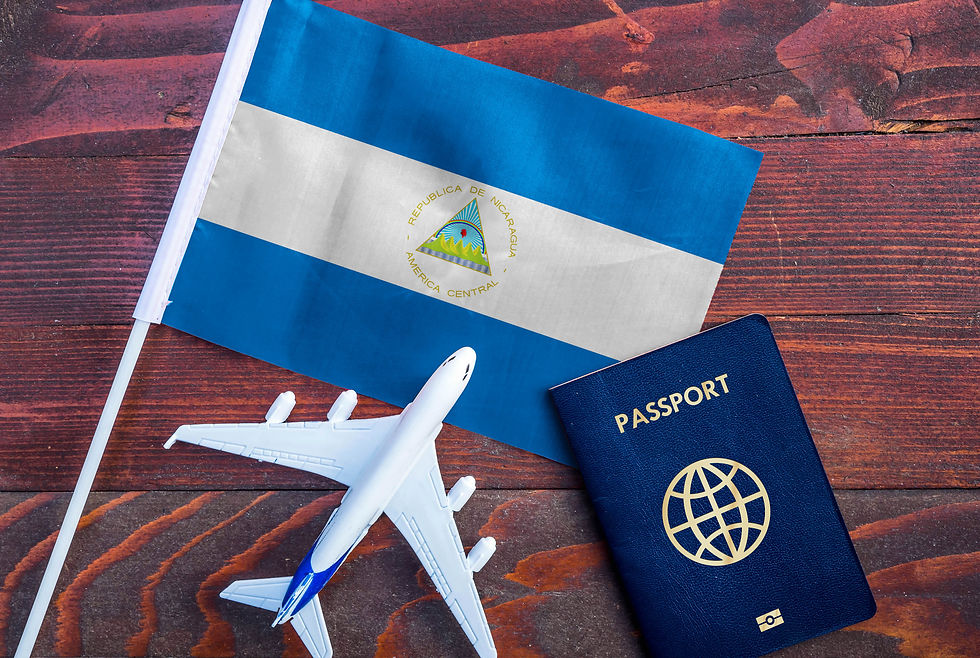U.S. Cracks Down on Nicaragua Migration Networks
- Alexander Fernandez

- Nov 20, 2025
- 4 min read
By Alexander Fernandez, Reporter
The United States revoked visas and imposed new travel restrictions on individuals in Nicaragua who, according to the State Department, facilitated irregular migration routes that moved travelers toward the U.S. border. In a Nov. 17 announcement, the department said the action targeted owners, executives, and senior officials in transportation companies, travel agencies, and tour operators that marketed or coordinated travel for migrants seeking to illegally reach the United States. The Department acted under Section 212(a)(3)(C) of the Immigration and Nationality Act, which bars entry to individuals whose activities could create serious adverse foreign policy consequences, and revoked currently valid visas while adding restrictions to prevent the individuals from entering U.S. territory.

The State Department said investigations linked the group to entities that arranged travel through Nicaragua and offered transit routes that moved passengers from Africa, Asia and South America toward the U.S.-Mexico border. Officials said Nicaragua’s migration environment allowed these routes to operate with limited oversight and strengthened travel models that supported regional smuggling networks. The Department said it aimed to disrupt irregular travel at earlier stages and limit the number of individuals who reached the U.S. border through Nicaragua-based routes. Nicaragua became a common arrival point for long-distance travelers because of its visa policies and the accessibility of its flight routes.

U.S. Customs and Border Protection (CBP) data showed the broader trend. The agency reported nearly 11 million encounters from October 2019 through June 2024. CBP uses the term “encounters” to describe every time officers meet someone trying to enter the United States without authorization, including people who are apprehended between ports of entry, turned back at an official crossing, or processed and released under immigration law. Department of Homeland Security (DHS) briefings said the pressure begins long before migrants reach the U.S. border because large numbers move through South America and Central America on their way north. That movement increases the strain on border processing once the migrants arrive. CBP reported that about 81% of all encounters during this period occurred along the southern land border, and Texas accounted for nearly half of those encounters.
The human impact of traveling through these irregular routes appeared in multiple public interviews collected by humanitarian organizations. Doctors Without Borders (MSF) previously recorded testimonies from migrants who traveled through Central America and described dangerous conditions during multi-leg journeys. One traveler told MSF field teams, “The route was full of risks. People walked for days without food or water.” The Office of the U.N. High Commissioner for Human Rights (OHCHR) published similar accounts, including one from a migrant who said, “We were vulnerable the entire way. Smugglers controlled everything.”

Migration Policy Institute (MPI) research added further context. A 2023 MPI report noted that limited legal options in origin countries increased reliance on private intermediaries and irregular routes. The report stated that migrants who used those routes faced heightened vulnerability to extortion, unsafe transportation and financial exploitation. Those findings helped explain the broader environment in which U.S. officials issued the visa restrictions.
The action also aligned with earlier U.S. measures directed at Nicaragua. A 2022 Congressional Research Service report found that, by early 2023, the Treasury Department sanctioned more than 40 Nicaraguan officials and several entities. The State Department had already restricted travel for hundreds of officials and family members for actions that undermined democratic processes. The new restrictions expanded that pressure to individuals in Nicaragua’s private travel sector, which U.S. officials described as a central access point for irregular migration routes.
The decision followed additional policy developments affecting Nicaraguan nationals in the United States. The Department of Homeland Security (DHS) announced the termination of Temporary Protected Status (TPS) for Nicaragua, effective Sept. 8 2025. DHS estimated that about 4,000 Nicaraguans held TPS at the time. Humanitarian organizations said that when people lose legal status or the ability to work in transit countries, they often face stronger pressure to keep moving north, especially when lawful migration options are limited.

Transportation industry observers said the restrictions could affect flight operators, ticket agencies and tour companies that arranged international travel through Managua. Businesses that sold multi-leg ticket packages or organized regional transit routes faced new compliance reviews as officials evaluated whether their services connected to irregular migration pathways. U.S. officials said lawful companies could continue operations but emphasized scrutiny of individuals who knowingly supported irregular travel.
The geopolitical context surrounding the decision extended beyond Nicaragua. Central America continued to experience political instability, uneven border enforcement and economic pressures that shaped migration routes across the region. U.S. officials viewed Nicaragua, Cuba and Venezuela as critical points in transcontinental migration flows that connected travelers from multiple continents to the Western Hemisphere. That dynamic affected border management, regional diplomacy and cooperation on return or repatriation agreements.

State Department spokesperson Matthew Miller said, “Our coordinated efforts with Mexico are demonstrating positive results at our shared border.” Officials used that assessment to underscore the role of upstream enforcement in reducing border pressure. They said coordinated regional actions, including visa restrictions, formed part of a broader strategy to strengthen lawful migration pathways and disrupt smuggling networks.
The State Department said the United States would continue to target individuals who profited from irregular travel and would evaluate additional measures to reduce dangerous journeys through Central America. Officials said the restrictions advanced national security and immigration enforcement priorities, supported lawful migration options and sought to limit humanitarian risks for individuals who attempted multi-country travel toward the United States.








Comments